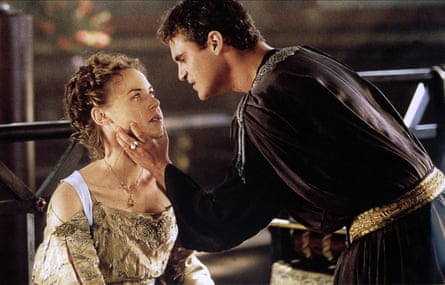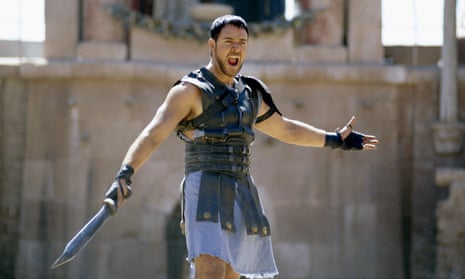When Gladiator was released in early May 2000, there wasn’t much of an inkling that it would go on to win the Oscar for best picture, for the obvious reason that it was positioned as the first of the summer blockbusters, promoted less for its historical gravitas than its bloody combat in a digitally enhanced Colosseum. In retrospect, it shouldn’t have been a surprise that two and a half hours of speeches, montages and decadent pageantry would fit into a broadcast that’s an hour longer and slightly less violent. But the best picture designation has been an odd stain on Gladiator’s reputation over the years: a film that might have been remembered as a satisfying revenge spectacle instead looks like a second-rate prestige picture.
Twenty years later, perhaps it’s time to take Gladiator back to its original framing, not as the spoiler to Steven Soderbergh’s unlikely coronation as a Hollywood director – his Erin Brockovich and Traffic were best picture nominees, and he won best director for the latter – but as a classed-up underdog sports movie, like a middle-period Rocky sequel in sandals and tunics. The palace intrigue that follows the death of the Roman emperor Marcus Aurelius may give the film a certain amount of sophistication, as do the performances by Russell Crowe, Joaquin Phoenix and Connie Nielsen, who all make excellent and multi-layered contributions. Yet this is essentially about an undersized warrior gutting his way to a title bout – all else seems like window-dressing by comparison.
The competitive arc of Gladiator is Rocky III leading into Rocky IV. It’s about our hero first belting his way through a colorful array of opponents – barrel-chested goons, armor-plated archers on chariots, man-eating tigers emerging from the arena floor – before finally battling the villain on hostile turf and turning the home crowd to his favor, against the will of a brutal authoritarian government. Again, this is not a mark against the film, because it’s mostly rousing on these terms, boosted by a Roman succession plot that plays one man’s epic revenge quest to the highest of stakes. But the argument that the film is any deeper than the red-meat savagery it delivers doesn’t hold up under scrutiny. It’s a terrific summer movie, and one of the new century’s least deserving best picture winners.

For director Ridley Scott, it started a run of enervating historical action-dramas that included Kingdom of Heaven, Robin Hood and Exodus: Gods and Kings, none of which had the same propulsive kick. The benefit of Crowe’s Oscar-winning lead performance – and a script (by David Franzoni, John Logan and William Nicholson) that was geared around it – is that he makes it impossible to get lost in the hectic atmosphere Scott conjures here from hundreds of extras, digital landscapes and assorted period bric-a-brac. There’s a lot to draw the eye away from the central action in Scott’s films – Orlando Bloom, for example, doesn’t have the presence to draw focus in Kingdom of Heaven – but Crowe’s General Maximus Decimus Meridius has a simple and well-defined mission, and the actor plays it as righteous as a sword plunged straight to the hilt.
Contrasting the scorched earth of Germania, where Maximus leads his men in one final push against the barbarians (“At my signal, unleash hell!”), with the golden fields of home, where his wife and son await after his years away, Gladiator begins with a patriot’s humble request. In exchange for his service to the empire, he wants a little time off – those fields ain’t gonna harvest themselves, you know? But he gets caught up in circumstances beyond his control: the dying Marcus Aurelius (Richard Harris) wants him as a placeholder to boost the senate and lead Rome toward democratic rule. But that means passing over his vile, sadistic failson, Commodus (Phoenix), who craves the unfettered power of an emperor and unnaturally shortens his father’s life to get it. Commodus condemns Maximus to a quiet execution in the forest, orders his family murdered and sets about engineering the dissolution of the senate and a comprehensive quashing of dissent.

When Maximus is picked up by slavers in Zucchabar, a Roman city that would now be in Algeria, and he’s forced to battle to the death alongside other gladiators – first in local events and later in the Colosseum, where he becomes a sensation. The fun irony is that the feckless Commodus has brought the gladiators to Rome as a bread-and-circuses initiative to distract the great unwashed while he seizes total authority over the empire. Now with Maximus besting all comers in front of lusty boobirds turned super-fans, chanting his name like the Soviets rooting for Rocky, Commodus’s hold on the throne is becoming more tenuous.
Phoenix is a wonderfully hissable villain as Commodus, a legacy brat who understands his own absence of nobility and honor as liberating qualities – like any good tyrant, he sees a clean conscience as a terrible obstacle to his ambition. But most of the behind-the-scenes complexity comes courtesy of Nielsen as Lucilla, Commodus’s sister and Maximus’s former lover, who acts with political expediency in order to survive, but asserts herself firmly in the shadows. Lucilla is a glimpse into what Gladiator might have been if its priorities were directed more toward the machinations of government rather than the machinations of separating a man’s limbs or head from the rest of his body.
The action sequences in Gladiator dance right on the edge of coherence, which may have something to do with the difficulty of matching live-action with digital backdrops, but mostly falls in line with popular action directors like Michael Bay or Scott’s brother, Tony, who were favoring movement and viscera over the nuts-and-bolts of clear blocking. When Maximus is battling an undefeated chest-thumping hulk twice his size named Tigris and actual tigers appear in support, it becomes obvious that we’re being treated to a bread-and-circuses gorefest along with the Roman commoners. And once you come to that realization, Gladiator no longer seems like a bid for respectability. It had respectability imposed on it.

Comments (…)
Sign in or create your Guardian account to join the discussion